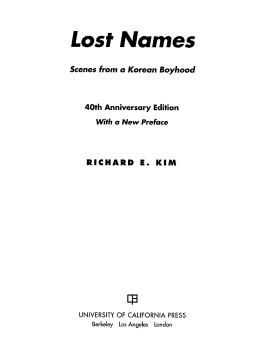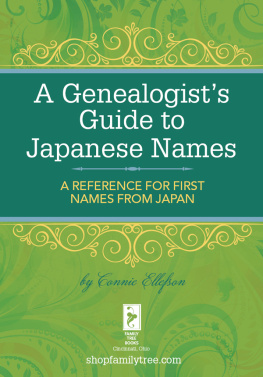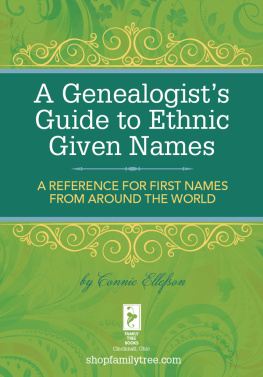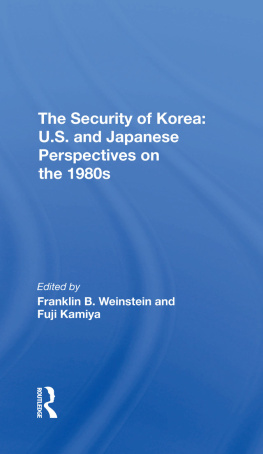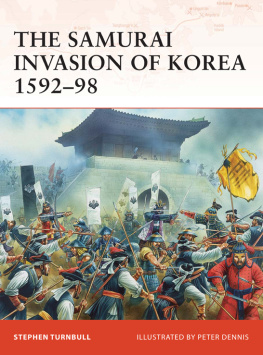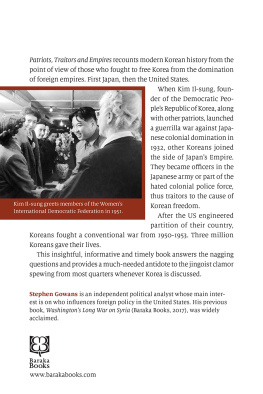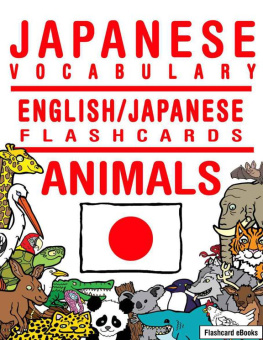Lost Names
Scenes from a Korean Boyhood
40th Anniversary Edition
With a New Preface
RICHARD E. KIM

UNIVERSITY OF CALIFORNIA PRESS
Berkeley Los Angeles London
University of California Press, one of the most distinguisheduniversity presses in the United States, enriches lives around theworld by advancing scholarship in the humanities, social sciences,and natural sciences. Its activities are supported by the UC PressFoundation and by philanthropic contributions from individualsand institutions. For more information, visit www.ucpress.edu.
University of California Press
Berkeley and Los Angeles, California
University of California Press, Ltd.
London, England
First Paperback Printing 1998
1988 by Richard E. Kim.
Remembrance of Things Lost 1990 Richard E. Kim.
Authors note 1998 by Richard E. Kim.
All rights reserved.
Library of Congress Cataloging-in-Publication Data
Kim, Richard E., 1932-
Lost names: scenes from a Korean boyhood / Richard E. Kim.
p. cm.
Reprint. Originally published: New York : Universe Books, 1988.
ISBN 978-0-520-26812-8 (pbk.: alk. paper)
eISBN 978-0-520-94812-9
1. Kim, Richard E., 1932Childhood and youth. 2. Authors,AmericanBiography. I. Title.
PS3561.I415Z473 1998
813'.54dc21
[B] | 97-46168
CIP |
To my father and mother,
and for my children
Contents
Preface to theFortieth Anniversary Edition
Speech given at the Fiftieth International PEN Conference at Lugano,Switzerland, May 12, 1987
Good afternoon, ladies and gentlemen.
To begin with, let me tell you that this is one of the best-organizedconferences that I have had the pleasure of participatingin (and I have been to many). For that I would like tothank the organizers and the staff. I would like to thank theBritish Council of Hong Kong and the Department of Englishof Hong Kong University for creating the idea of this conferencein the first place. I remember writing to Jill Martin andcommending her and all those involved in organizing thisconference for the very idea of hosting a conference of thisnature. And I would also like to thank this conferencefroma very personal point of viewfor inviting me to participatein it because the invitation helped mein a rather unexpectedway, I confessto clarify and define to some extentwhat I think of myself by understanding what others seem tothink of me.
I am an American and have been one for more than a quarterof a centurybut, as you all know, appearances can bedeceiving....
I live, and I have lived for more than twenty years, in a veryliberal, small academic town in what must be the most liberalstate in AmericaMassachusetts.
Nowmy barber in that very liberal academic town in thatmost liberal state in the Union still greets me at each of mytonsorial visits to his shop by saying, Well, youre still here, eh?
Well, yes, I am still here as you can see.
So, what are you studying these days?
Thatafter all those years of my academic life as professorof English at the university in his town.
I merely mumble something to the effect that I am, well,studying life, sort of.
Then there is this blue-eyed, blonde, lady bank teller whoasks me where I am fromthe sort of question no one everasks my blue-eyed, brunette wife of Danish-German ancestry.
Again, I mumble, Oh, from here and there.
The lady and I are trying to untangle a bureaucratic mishapinvolving a quarter of a million dollars of our businessaccount, and, speaking on the phone to someone at the mainoffice of the bank, she saysoh, so sweetlyLook, Jane, Ihave here with me a very nice foreign student who... blah,blah, blah...
Well, it has been also like that for me in the States in myrelation with the so-called American literary establishment.
I remember that when my first novel, The Martyred, waspublished in New York I was simply presumed to be and waspresented as a Korean writer, and, no one, including myself,minded thatexcept the Koreans in Korea, especially Koreanwriters and critics who felt that since I wrote in English Ilacked proper credentials and legitimate claims to be a Koreanwriter.
In fact, a professor-critic there who made his living mainlyby putting out anthologies told me in all seriousness thatwhen I finally wrote somethingby God, said he, anythinginKorean, he would certainly include me in one of his literaryanthologies.
To this day, I am not considered, so I am told by Koreanwriters and critics, to be qualified as a proper Korean writer.
So it went till my third book was published in the States,when Professor Edward Sidensticker, an eminent authorityon Japanese literature reviewing the book most favorably, referredto me as Richard Kim of Korea, whereupon the progressive,liberal staff of the New York Times Book Review listed thebook in the Reviews list Editors Choice and defined me categoricallyas a Korean-American writer. The dawn of hyphenatedAmericans (not all of them, mind you) has arrived.
But, that, of course, made the Korean writers and critics moreadamant than ever about my literary status (or nonstatus).
Now, really, all this is quite silly, but what it all seemed tosignify was that, from a literary point of view of categorizingwriters, I was a very inconvenient writer indeedboth to theKoreans and to the Americans.
Well, I really was too busy doing this and that nonliterarything to care much about all that, but I did want to look intothis business of my Koreanness, so to speak, just to see, if fornothing else, if I could also write in Korean.
To make a long story short, it did turn out that I could indeedwrite in Korean, and thank God for that, and that wasthat. That is, as Dr. Han Suyin has remarked the other day, Icould just think of myself as a writer at peace with the world,the whole world, in diverse cultures and languages, and let theliterary intelligentsia and academicians worry about the rest.
And yet the very theme of this conference, not so muchabout in English, I confess, as about Asian Voices, hasmade me realize that, at last, I have now found one unequivocal,unchallengeable claim that I can make about myself,about my literary status and identityI am an Asian writer.How nice!
Now, to this matter of in English. I do write in English,more so than in Korean, and I think I can say that I am onewriter who is madly in love with the first-person I of theEnglish languagefrom the point of view of the metaphysicsof Being.
The joy, excitement, and wonder that came to me when Ifirst discovered the impact of the I in Englishand I amsorry it is all so personal, not intellectual, that I really cant gointo it all at this pointwell, it was like when, on my maidenvoyage to the United States, in the middle of the vast PacificOcean, I came, alone, face to face with the sun emergingfrom the waves on the morning horizon... and it was then asif I saw the sun for the first time in my life, it speaking to meand I speaking to it.
I think it all went with my own private exploration, discovery,of my Self, now utterly alone, physically and psychologically,away from Korea toward the unknown...
And later, when I began to write in English, the I in Koreangave way willingly and joyously to the I in Englishandit was like discovering and assuming a wholly new identityof Being and, with it, a wholly new way of seeing, thinking,cogitating, and understanding, having shed the Korean Ithat is not really I but that is subservient, always, to the Koreanwe.

